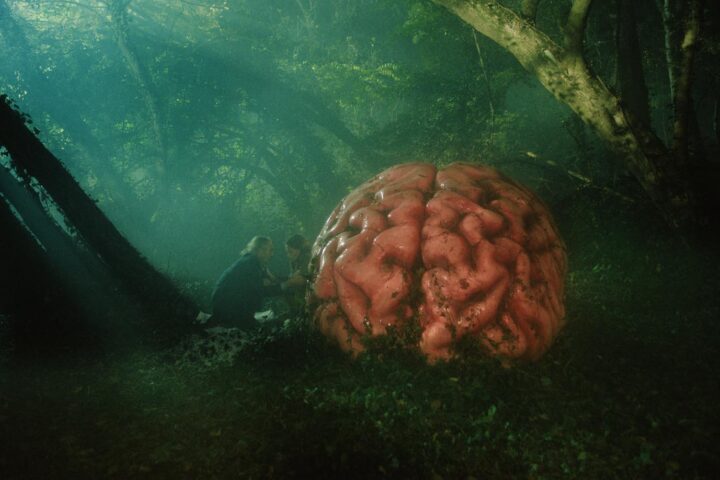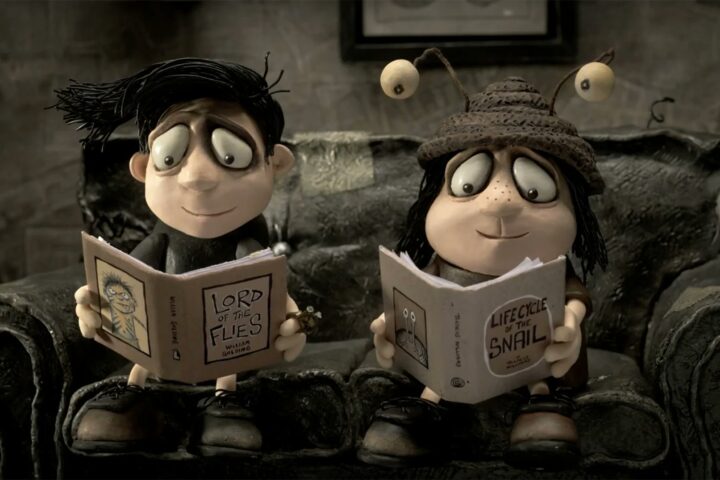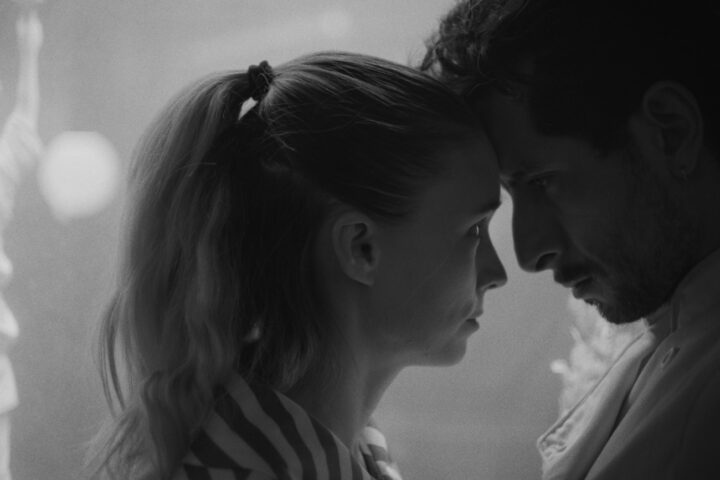In Rumours, a genre-defying work set at an imagined G7 summit, the United States president might seem as sleepy as the media caricature of Joe Biden. Yet Charles Dance’s incarnation of a figure embodying such stately authority also inexplicably speaks with a British accent. This slippery distinction between reality and surrealism provides a sure sign that the film came from the mind of iconoclastic director Guy Maddin, who co-directed and wrote the project with his former students, Evan and Galen Johnson.
At every step of the way, Rumours thwarts and confounds expectations that this convening of fictional world leaders at a gazebo in the German forest will ever shift into standard political satire. Diplomacy quickly fades from being subject to serving as a mere backdrop to absurdist horror-comedy. As the seven leaders retreat into the forest under the guidance of their host, German Chancellor Hilda Orlmann (Cate Blanchett), their indecisiveness and immaturity already jeopardize their ability to write the official statement of the gathering.
But they prove even less equipped to handle the threat posed by an encroaching gaggle of bog people, who could represent a zombified reincarnation of the summit’s theme: “Regret.” Or, perhaps more likely, they stand for nothing in particular. The filmmaking team finds an endless variety of ways to showcase the group’s helplessness and inutility in the face of apocalyptic danger. It feels almost incidental that they happen to represent the faltering bulwark of Western democracy, which makes the oddball sensibility play all the more hilariously.
I spoke with the trio of directors ahead of Rumours’s theatrical opening. Our conversation covered why they avoided dwelling in timely political satire, how their Canadian identity informed their perspective on international relations, and why a sundial emerged as such a pivotal object within the film’s finale.
I once heard Jon Stewart liken creating political comedy to making egg salad—delicious when fresh but tastes like shit a couple of days later. How did you calibrate making something topical but also timeless?
Evan Johnson: When we knew we were going to make a movie about the G7, something that appealed to us had almost nothing to do with anything topical. It was more this feeling that this is a type of self-contained world, and we like self-contained worlds. It has its own private language, and we like private languages. We could see it entertaining us to see these people trapped in their own self-contained private language.
Guy Maddin: Every character is a president or a prime minister. It’s like the idea a child would have, like making a painting of only primary colors or something.
EJ: I think there was no effort to be topical whatsoever.
GM: That might save us from the fate of Jon Stewart.
EJ: It’s definitely a thing we would have been afraid of. There are good political satires. Dr. Strangelove has aged well, though nobody seems to care about the nuclear threat anymore even though it’s still a big threat. It comes and goes, people’s worries about it. That movie has aged well because its characters are great and it’s unflinching in its vision.
GM: It captures the atmosphere of fear. But we know that making a movie takes a long time, and that the world by the time you finish your movie is going to be different. Sure enough, we were about 10 crises du jour down the road by the time we’d finished editing it. We wanted to make sure we were unspecific about it. More or less, it was just part of the premise that there’d be a crisis. But it was stronger for us not mentioning it. That wasn’t out of sheer practicality—far from it. I think it’s just an excuse to be involuted and present a realm in which the same people have been meeting for 50 years. They’re not literally the same people—many of them have been in power for many years—but it’s the same type of people that are produced by the systems in these Western democracies, and they would speak this way. That’s the vocabulary.
A long time ago, I made a movie called Careful about a small town that lived on the steep slope of a mountain, and everybody in that town lived in fear of setting off an avalanche. Everything in their personalities was completely immersed in too much caution, and it was just such a great starting point for the movie that, ever since then, I’ve loved that kind of involution. Everything they do is infected with this kind of vocabulary, of saying something without saying something. It gave Evan a chance to riff inwardly because he’s got such a good ear for this kind of dialogue.
On the note of private language, one thing you lambast the G7 leaders for is the type of copy-paste statements that come out of these summits. Was there any dialogue you were lifting directly from any of their statements?
EJ: I think at the very end of the movie, when there’s a speech delivered by the Canadian prime minister, there’s some language in there that’s probably literally copied and pasted from G7 statements. I think the rest of the talk and the movie was just stuff that’s ended up in the back of my head from just reading the news and seeing the statements. It’s not rocket science; they talk in a certain way, and you’ve heard it a lot before, yeah. Once you’ve decided that that’s how these people talk, even when they’re alone and trying to talk about something like their marital problems or sex, it’s going to come out to each other.
Galen Johnson: This language is like a prison that we’ve trapped them in.
EJ: There’s still talk of back-benchers and private sectors even when they’re getting undressed.
You cheekily thank the participation of the G7 leaders in the opening title cards, but what elements were you exaggerating from research as opposed to inventing from whole cloth? Was the Mean Girls-esque clique energy rooted in reality?
EJ: I remember reading after we wrote the script that someone accidentally recorded Trudeau and Boris Johnson joking about Trump or Putin. It’s not like we think, “Oh, poor Trump and Putin! The other leaders were making fun of them.” The world has cliques! There are alliances between countries that nothing seems to be able to break, like Israel and the U.S. for some reason.
GJ: The “one magical night together” nature of this movie led us to influences like Dazed and Confused and American Graffiti. We tried to inject those types of relationships in there as well.
GM: Yeah, one magical high school grad night where they’re all going off to their separate futures, and they’ll never see each other again, but they’re having one last enchanted evening full of romance, action, fear, and adventure.
EJ: I don’t know if we had a reason beyond [thinking that] it was funny or sweet to us to imagine, briefly, these people just as figures from high school. It was something to steer us away from political satire, really, or come at the problem from a different angle.
Color plays a vibrant role in Rumours, so I’m curious as to when visual elements such as that start coming into the way that you’re conceptualizing the film.
GJ: We wanted some groundedness at the start and go from there. We’re suckers for saturated colors and heightened visual atmospheres. It made sense to take the movie there once night fell.
GM: You start with daylight and extras, whoever’s at such summits, and the leaders, and a kind of flag-y color palette. Once the sun sets, that gives you room to get a little bit more dreamy.
EJ: It was a struggle, though, to figure out how to visualize interestingly just seven people wandering in circles talking to each other.
GM: And to have it say something.
EJ: There’s a temptation to make it look as banal as possible. Don’t make it look pretty, just make it look dull and ugly like late Luis Buñuel. It never looks ugly because he’s a master of the form, but he desaturates. There’s a lot of standing still in a brightly lit room in those movies. We discussed different approaches and ended up with whatever this one is.
GM: We even watched Seven Samurai because no one’s better at blocking groups of people than Akira Kurosawa. Maybe some people are better, but he seems about as great as ever. We took notes and frame grabs and even decided to try some of his blocking, but it all fell away because it was difficult. He had well over 100 days to shoot Seven Samurai, and we had 23 to shoot this. But also because that kind of formal rigor just wasn’t required of the movie. If it were, we probably would have made [use] of that kind of formal composition. It just felt right that they were raggedly making their way around the forest, so we didn’t need to bother with that. It would have been inappropriate and maybe even annoyingly formal or composed. It just fell away because we knew it wasn’t important.
Canada’s role in the summit starts somewhat quiet, as it might feel in reality, and then takes on a pronounced role. As Canadians, what do you think the country’s perspective on the fate of Western democracy adds to the conversation?
GM: Well, first of all, Canada is one of the most insignificant countries in the world, or that’s the way we were raised to believe.
EJ: We’re definitely the most insignificant country in the G7 if you think in terms of just economic or diplomatic power. Canada is maybe self-perceived as a diplomatic entity. It’s not so much [included for] its large economy or outsized economic influence as its diplomatic power. I’d like to say this, as a historical aside, that it was a G6 for one year before Canada was added almost entirely on the power of Pierre Trudeau, the Canadian prime minister and Justin’s father, who was bilingual and a more experienced political leader than everyone else in the G6 at the time. They needed someone who knew politics and knew the international stage better…
GM: …and could just run a meeting!
EJ: Exactly! Ironically, Canada was allowed into the G7 for that reason.
GM: It could have just as easily been for catering skills, but it was for diplomatic skills.
EJ: It’s our sense of humor, I guess, that it’s funny to us to imagine Canada as an action-hero leader of the other nations. That’s just stupid and makes us laugh. But we had the right actor for it too. We have an unbelievably great performance from Roy Dupuis embodying all that. A lot of it is just based on writing for writing for that actor.
GM: He’d been in our heads the entire process, Roy Dupuis, so he almost took over. He headed us toward that ending.
Is the ending sincere? Obviously, it’s synthetic and a bit sappy, but is it wrong to feel roused by the final speech?
GM: I’m glad to hear you were roused!
GJ: It’s right to be roused by the music, which is the most rousing music of all time. The speech itself is…maybe the music is doing most of the rousing.
GM: I love the fact that the speech is surfing on this tsunami of “The Pines of Rome.”
EJ: I don’t think the speech was meant sincerely. It’s basically a suicide speech because its final lines are cut and pasted from Maxime’s earlier suicide note. If you take a cosmic or very distant perspective on the Earth and what we’re doing on it, it does look like we’re hurtling to our own demise on purpose. It’s not anyone else who’s doing the destroying of ourselves. It’s us. So it just felt like, from the widest possible perspective, this is the only way to depict what we’re doing.
GM: Fifty years of G7 summits and we haven’t done anything. We might as well at least have a rousing speech about our imminent demise.
EJ: That the very last line is rock ‘n’ roll plagiarism feels very politics to me.
GM: Exactly. Very brat summer.
EJ: It should have ended with the screen going green.
How did the sundial, equal parts useless and utilitarian, emerge as such an important object within the film and the final speech?
EJ: I can go on the record about this. Galen and I lived in a small town, Pinawa, in Canada. When we were young, the town had a sort of crisis when the main employer was shutting down, and everyone was worried about how it was going to survive. We were teenagers, so we had a somewhat childlike hope that some solution would come and save the town.
GM: The town was built on nuclear research, and everyone in the town was a nuclear physicist.
EJ: And then the town, one day, announced it had a big, special project it was unveiling. It was unveiled, and it was a sundial. We were disappointed.
GM: It was like one of those roadside attractions.
EJ: It was a big sundial, like the size of a boardroom table. Manitoba’s largest sundial!
GM: [The idea was that] tourism would replace nuclear projects.
EJ: I have to say, the people who designed the sundial were wonderful and smart.
GJ: It’s very functional!
EJ: It’s beautiful, and I admire them. I think they’re great, but as a teenager, it became this icon of disappointment for us. Something insufficient, an empty public works project.
GM: That’s great, I never knew that! But there’s another anecdote worth mentioning in connection with the sundial. The actor Denis Ménochet, whose character comes up with Western Europe’s biggest sundial proposal to save the world, got so into studying and prepping for his role that he wrote a really beautiful and well-researched essay on sundials.
EJ: It’s probably something that the bog people would have had at their disposal as well.
GM: Navigating by star constellations.
EJ: Something ancient…ancient disappointment!
GM: Iron Age disappointment.
You made this film against the backdrop of widespread anti-elite sentiment that’s leading to a global revolt against incumbents. While it takes place in a very closed world, did making this film show you anything about what people want from a leader right now?
EJ: Maybe that’s too smart a question…I’m afraid your time’s up! [laughs] I would like to think I learned something, but I don’t think I did.
GJ: We learned stuff about practical filmmaking!
EJ: I would have maybe written it differently had I understood how it would be [released]. There might be more subtle digs at the actual politics of the world that I dislike, but it was written at a time when there was fatigue in us with the relentless daily assault of politics in every way.
GM: That hasn’t changed.
EJ: It was so tiring to be outraged all the time and trying to figure out, “Well, how do we help? What do I do?” That feeling was so enervating and sucking the energy out of me. We were like, “It’d be funny to make something that’s a respite from that feeling yet is set amongst the people who are supposed to be solving it.”
Since 2001, we've brought you uncompromising, candid takes on the world of film, music, television, video games, theater, and more. Independently owned and operated publications like Slant have been hit hard in recent years, but we’re committed to keeping our content free and accessible—meaning no paywalls or fees.
If you like what we do, please consider subscribing to our Patreon or making a donation.




